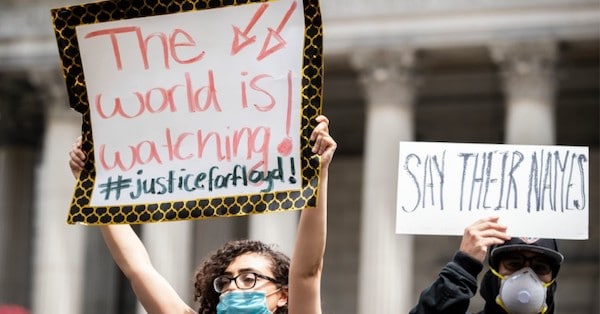A panel of international human rights experts on Tuesday called on the International Criminal Court in The Hague to investigate police violence against Black Americans, after releasing a searing 188-page report regarding the killings of George Floyd, Breonna Taylor, Eric Garner, and countless others by law enforcement officers.
The commission said the police killings of people of color in the U.S. constitute “crimes against humanity,” a finding it came to after hearing the testimonies of victims’ families at virtual public hearings held earlier this year.
“We are in the midst of a humanitarian crisis,” Emily Galvin-Almanza, founder of Partners for Justice, tweeted after the report (pdf) was released.
Good morning, we are in the midst of a humanitarian crisishttps://t.co/5WtrjAygMZ
— Emily Galvin-Almanza (@GalvinAlmanza) April 27, 2021
“The world is not only watching, it’s judging,” wrote historian Dr. Paula Lee.
The decision to label police killings as crimes against humanity “was not given lightly,” Hina Jilani, one of 12 commissioners and a pioneering Pakistani human rights lawyer, told The Guardian.
We examined all the facts and concluded that there are situations in the U.S. that beg the urgent scrutiny of the ICC.
To constitute crimes against humanity, a crime must be widespread of systematic and must be the result of policy, meaning “a State or organization intends to carryout an attack against a civilian population, whether through action or deliberate failure to take action.”
Experts from 11 countries formed the Commission of Inquiry on Systemic Racist Police Violence last year after the families of several Black Americans killed by officers petitioned the United Nations to investigate the country’s epidemic of violence.
Under pressure from the Trump administration, the U.N. Human Rights Council declined to focus its inquiry on the U.S., which led the International Association of Democratic Lawyers, National Conference of Black Lawyers, and National Lawyers Guild to conduct their own investigation.
The commissioners heard the stories of dozens of victims, including: Michael Brown, whose fatal shooting by Officer Darren Wilson in Ferguson, Missouri led to a wave of racial justice demonstrations in 2014; 12-year-old Tamir Rice, who was killed after holding a toy gun in a Cleveland park that same year; and Freddie Gray, fatally injured while in Baltimore police custody in 2015.
The testimonies led the commission to conclude that:
- Traffic stops by armed officers, conducted under the pretext that drivers could be committing a crime, are common precursors to excessive force and police killings;
- There exists in the U.S. “a pattern of police violations of the Fourth Amendment rights of Black people to be secure in their persons, houses and effects from unreasonable searches andseizures”;
- “No-knock warrants,” like the one used by the Louisville police officers who shot Breonna Taylor in 2020, “proliferate in cases of police violence against people of African descent”;
- Lethal use of force against Black Americans experiencing mental health crises, including Daniel Prude in Rochester, New York and Shereese Francis in New York City, both in 2020, is “routine and systematic”; and
- “An alarming pattern of manipulation of evidence, cover-ups, obstruction of justice, and collusion between various arms of law enforcement” exists in the U.S., including in the case of Michael Brown, in which the officer “was permitted to bag his own gun and wash the victim’s blood off his hands, thus destroying evidence.”
Jilani told The Guardian that the panel found the testimonies to be “extremely distressing.”
“This country, which claims to be a global champion of human rights, itself fails to comply with international law,” she told the outlet, adding that the families’ stories made it clear that “this was no longer an account of individual trauma, it was an account of trauma inflicted on a whole section of the U.S. population.”
In its report, the commission called on the U.S. government to:
- Support the BREATHE Act, “specifically those provisions aimed at divesting federal resources from incarceration and policing…and instead invest in new non-punitive and non-carceral approaches to community safety utilizing funding incentives”;
- Create an independent National Federal Law Enforcement Oversight Commission, with power to monitor and regulate the performance of all 18,000 police departments in the U.S., implementing a “zero tolerance” policy for instances of police brutality and use of excessive and deadly force;
- Remove qualified immunity, which protects police officers from civil lawsuits; and-Prohibit no-knock warrants and chokeholds, among other recommendations.
The commission expressed hope that an investigation by the ICC would force the U.S. government to “support much-needed change,” The Guardian reported.
“We felt that the U.S. would benefit were individual police officers further deterred from resorting to unjustified force, knowing that some kind of international criminal responsibility might be held against them,” Jilani told the outlet.

